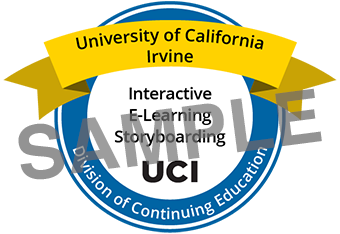E-Learning Instructional Design
Organizations are increasingly recognizing the value of providing learning online or via a learning management system (LMS) — especially when supporting remote or hybrid workforces. To that end, they need learning and development (L&D) professionals who have mastered both the theories and science of how people learn, and the technology to create effective learning experiences.
This real-world focused program — taught by industry experts who deliver practical knowledge derived from their own experiences — provides a solid foundation in the skills required to align e-learning strategies with business strategies and will prepare you for a successful career in instructional design.
You’ll acquire knowledge and expertise in planning and designing training, managing projects, selecting appropriate technology, and developing e-learning. You’ll also learn techniques to help you address the inevitable challenges brought on by organizational and industry demands.
L&D professionals must also keep pace with industry advancements. Our comprehensive curriculum is infused with discussions that focus on instructional design developments, methodologies, and new technologies to help keep you and your skills on the cutting edge.
Who Should Enroll
- Instructional designers
- Instructional technologists or education technologists
- Training coordinators and managers
- Human resource professionals
- Teachers and other career changers
Learning Outcomes
- Plan e-learning projects, identify and work with stakeholders and subject matter experts, and manage project scope
- Analyze the management and cost issues associated with deploying online instruction
- Develop and deploy an online lesson and incorporate e-learning technologies
- Explore the features, benefits, and drawbacks of a range of rapid authoring and media development tools
- Get hands-on experience building an e-learning module in the practicum course
Program Benefits
- Take advantage of an online learning format that provides the convenience and flexibility you need to balance your education with work and family commitments
- Learn from a diverse pool of instructors who have decades of instructional design experience, provide one-on-one guidance and feedback throughout your program journey, and share a passion for helping you succeed
- Build a lasting personal and professional network by making meaningful connections with instructors and peers
- Earn your certificate and begin positioning yourself for career advancement in as few as 12 months
- Enroll in as many individual courses as you wish with no obligation to complete the program
Earn an Alternative Digital Credential
 Successful completion of a qualifying assignment within select courses offers you the opportunity to earn an Alternative Digital Credential (ADC). Also referred to as a digital badge, an ADC is a virtual record of specific skills and competencies you have acquired and provides a verifiable way for you to share your educational achievements with employers, colleagues and others via social platforms like LinkedIn or Facebook.
Successful completion of a qualifying assignment within select courses offers you the opportunity to earn an Alternative Digital Credential (ADC). Also referred to as a digital badge, an ADC is a virtual record of specific skills and competencies you have acquired and provides a verifiable way for you to share your educational achievements with employers, colleagues and others via social platforms like LinkedIn or Facebook.
Explore the criteria necessary to earn an ADC in:
- Interactive E-Learning Storyboarding
Applicable course: Designing and Developing Interactive E-Learning Courses (completed after 4/10/23*) - Level 3 Evaluation: Behavior Analysis Proposal
Applicable course: E-Learning Evaluation and Assessment (completed after 8/8/22*)
Learn more about Alternative Digital Credentials and how they can help you demonstrate your commitment to professional development and distinguish yourself in a competitive job market.
*Courses completed prior to indicated dates are not eligible for a badge.
Eligibility and Requirements
Apply to become a candidate for the program: A Declaration of Candidacy is required to establish candidacy in this program. Complete the application and pay the application and candidacy fee of $125 (non-refundable). Learn more about the benefits of becoming a candidate.
A candidate in the program is awarded a certificate upon the successful completion of six (6) required courses totaling 15 units, each with a letter grade of “C” or better. All requirements must be completed within five (5) years after the student enrolls in their first course. To receive the Certified Digital Certificate after completing all the program requirements, students must submit the Request for Certificate to initiate the certificate audit process. Students not pursuing the certificate are welcome to take as many individual courses as they wish.
Authoring Tool Requirements
All students in the program require current access to an authoring tool like Articulate 360 or other comparable tool for various assignments and projects throughout the program. Please contact the department for any available discount offers.
Before enrolling in the third course of the program (EDUC X417.1), students must purchase or otherwise have access to an authoring tool.
If using Articulate 360, Mac users will need to download a virtual environment software that creates a Windows interface on your Mac such as VMware Fusion or Parallels Desktop. You can then install Windows. Additional software and fees may be necessary.
Transfer Credit
Students who complete the E-Learning Instructional Design Certificate Program may be eligible to transfer credits into the following degree programs:
- University of San Diego – Master Degree in Learning Design and Technology
- University of the Pacific – Benerd College Master of Arts in Leadership (Organizational Innovation and Change Concentration)
- Excelsior College – Bachelor of Science in Liberal Arts and Bachelor of Arts in Liberal Arts
Discount



Association for Talent Development (ATD) members may receive a 10% discount. Visit the individual chapters for more information:
Professional Groups
Join our community on LinkedIn and Facebook to stay up to date on industry news, job postings, and more.
Meet Our Graduate

Certificate
Approximate Tuition
$4,440Format
OnlineDuration
12-18 monthsTotal Units
15Enroll and pay for courses as you go.
Have Questions?
Talk to an enrollment coach
Call: (949) 824-5414
Monday - Friday, 9am - 4pm (Pacific)

Course Schedule
Course schedules are subject to change. Individual courses may be taken without enrolling in the full program.
Prerequisite Courses
Required Courses
Also of Interest
Career Advancement Network
DCE is proud to offer our learners, candidates and graduates valuable career resources, including personalized career coaching, mentorship, online technology tools, live webinars, and more.
Corporate Education
Partner with UC Irvine Continuing Education to bring this program to your team. Our Corporate Education team can help your employees gain the skills that matter most to your organization.




